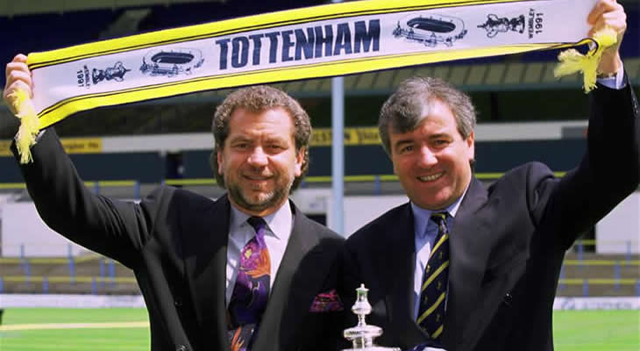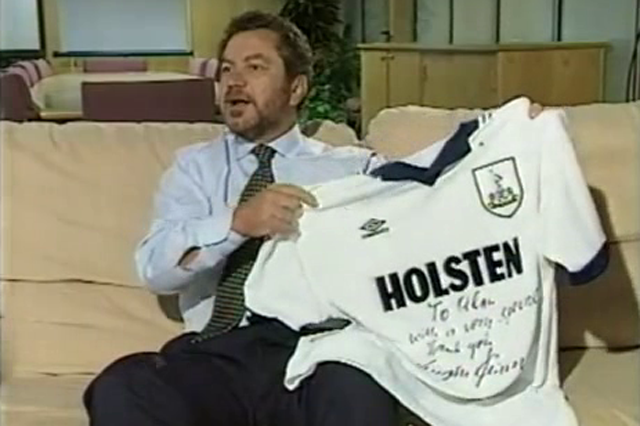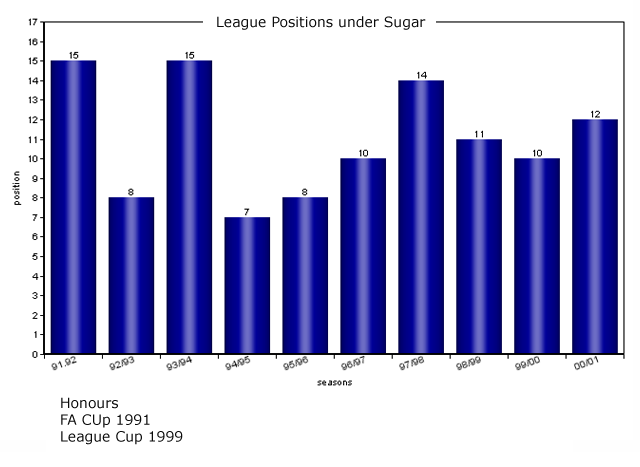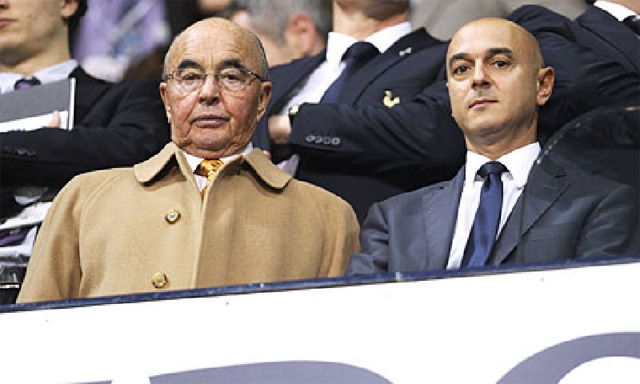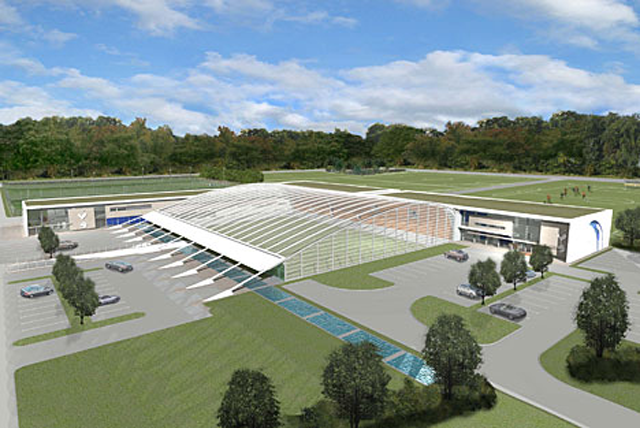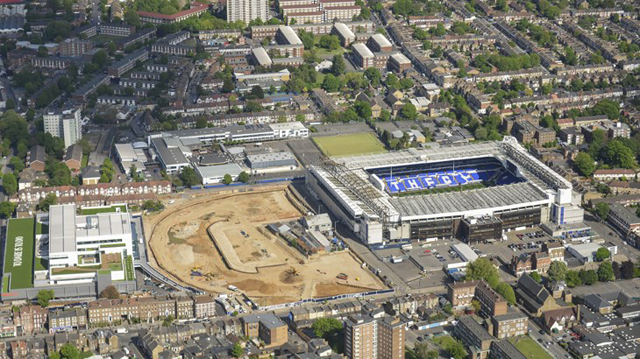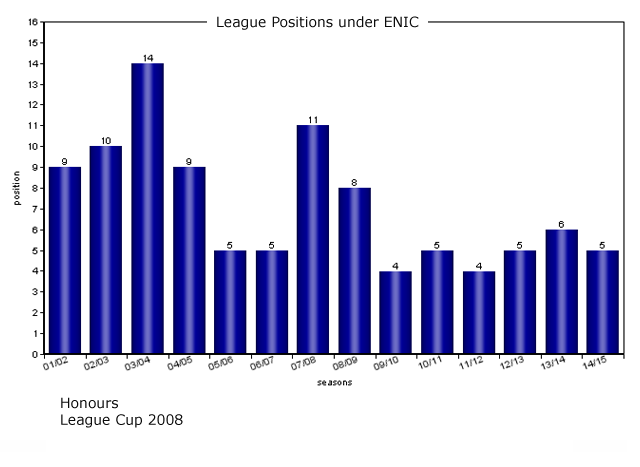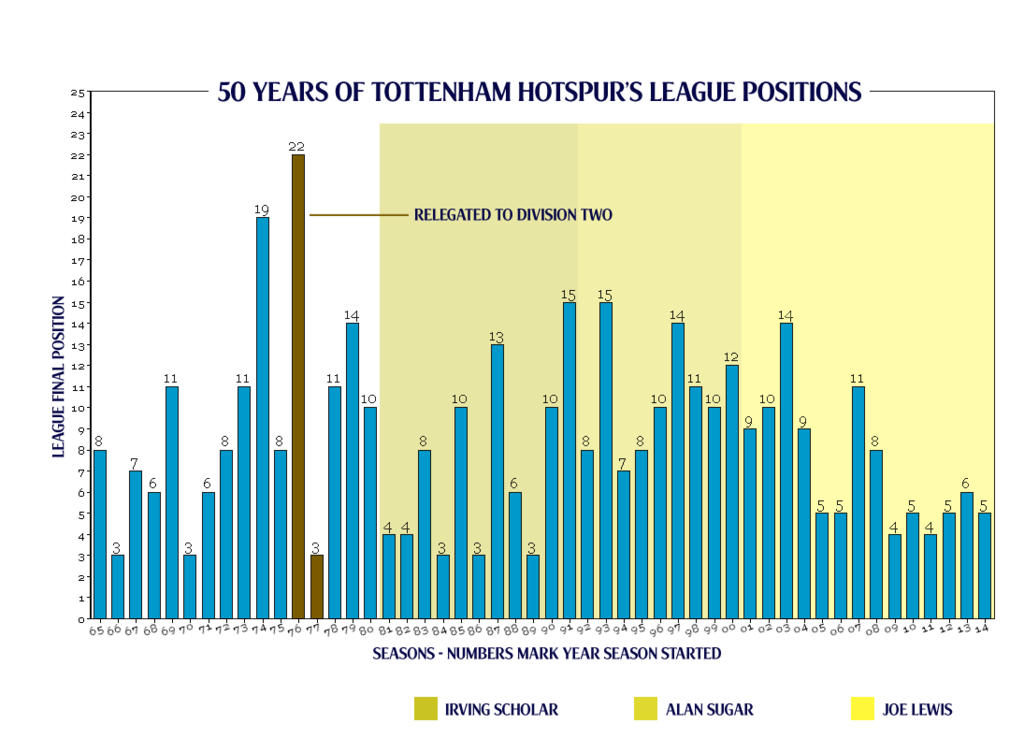REPost: wanted to see as many Spurs fans opinion on this as possible.
This case study looks back over almost three and a half decades of Tottenham Hotspur Football Club's Ownerships. It examines the people behind the club from 1982 through to the present day, focusing on the four men at the helm; Irving Scholar, Alan Sugar, Daniel Levy and Joe Lewis.
.
Irving Scholar
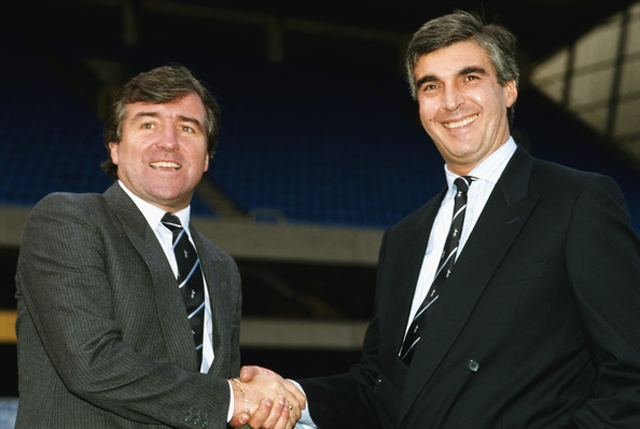
Scholar (right) pictured with Terry Venables (left)
In June 1984, shortly after bringing Tottenham Hotspur its first European trophy in twelve years, Keith Burkinshaw left White Hart Lane for the last time. Greeted by the press outside the ground, he gesticulated over his shoulder towards the rear of the shiny new stand behind him. ‘There used to be a football club over there’, he is said to have spat with contempt. These words may even have been apocryphal, but they turned out to be more prescient than anybody at that time than anybody could have imagined at the time. Whilst many might contend that football in Englands revolution began with the beginning of the Premier League in 1992, the truth of the matter is that the formation of this league was in many respects the end of a story rather than the beginning of one, and if that story has a birthplace then we could contend that this was at White Hart Lane. The application of Thatcherism to our national pastime began in a working class corner of North London, and its champion was a Monaco-based property developer in his late thirties: Irving Scholar.
Footballs decline as a spectator sport from the late 1950s on has been well documented, and Tottenham Hotspur itself declined throughout the 1960s and 1970s. Spurs had become the first club to win the league and cup double in 1961, but these were heights that wouldn’t be matched again. Throughout the 1960s and early 1970s there would be occasional false dawns at White Hart Lane, a League Cup here, an FA Cup there, but the retirement of long-time manager Bill Nicholson after sixteen years as its manager in 1974 hit the club hard. Spurs only narrowly avoided relegation the following season and when they did fall through the trapdoor in 1977 it felt like an inevitable culmination to several years of mismanagement. This, though, was about as bad as things got for the club. Burkinshaw may have taken the club down that year, but he romotion back into the First Division at the first attempt the following year, and the arrival of Osvaldo Ardiles and Ricardo Villa in the summer of 1978 was a clear signal of intent from a club emerging from the doldrums. In 1981 and 1982 the club won the FA Cup, and league performances improved sufficiently under Burkinshaw for him to begin to recognised as a man who could potentially get Spurs back to challenging for the league championship.
Away from the pitch, however, the times were a-changing. The West Stand at White Hart Lane was demolished in 1980, but its replacement overran its budget, took fifteen months to complete and left the directors of the club struggling to retain control of the club. In November 1982, and with the club in £4m of debt – a very large sum by the standards of the time – it was time for a change. The old directors, led by the families of Sidney Wale and Arthur Richardson, were swept away and a new group, led by a thirty-five year old property developer called Irving Scholar and with a board of directors led by a solicitor called Douglas Alexiou, replaced them. Within twelve months, the face of Tottenham Hotspur FC (and, we might venture, the face of the ownership of English football clubs) was changed forever. In the summer of 1983, Scholar announced that Tottenham Hotspur would become the first sports club anywhere in the world to float on the stock market. This, he claimed, would allow new investment in the club and patch the holes left by the over-budget West Stand at White Hart Lane and the growing discrepancy between static club incomes and spiraling transfer fees.
The clubs lawyers, however, identified one major issue which might yet cause problems for the floatation – a statute on the FAs rule books which prevented paying part-time directors and unlimited dividends to share-holders whilst restricting what could happen to the assets of a club were it to be wound up. The lawyers came up with a solution to this that was almost too easy to be true. They simply made Tottenham Hotspur FC a wholly-owned subsidiary of Tottenham Hotspur PLC and floated the holding company on the stock market instead. They sought the Football Associations permission to do this but it is not even known whether they received a response, and so it was that the FAs ninety year old statute which was designed specifically to prevent football clubs being used for the purposes of financial speculation was left effectively impotent. It’s a template that has been used time and again over the last three decades.
The following year, in August 1984, the first annual meeting announced pre-tax profits of £902,000 in comparison with £168,000 for the previous financial year. In spite of this, however, the decline of English football continued unabated and by the summer of 1985, with almost one hundred people dead as a result of the disasters of Bradford and Heysel, talk was starting to build of the biggest clubs seeking to break away from the rest. By October 1985 the fact that such discussions were taking place between the biggest clubs was an open secret, with Scholar himself saying after a meeting in Manchester between the owners of Spurs, Woolwich, Manchester United, Liverpool and Everton that, “If we don’t make changes, our sport will continue to decline.” This attempt at a breakaway in 1985 was quelled by the ‘Heathrow Agreement’, which allowed the First Division clubs to keep 50% of all TV and sponsorship revenue, but change, by this time, was in the air for the biggest clubs in England.
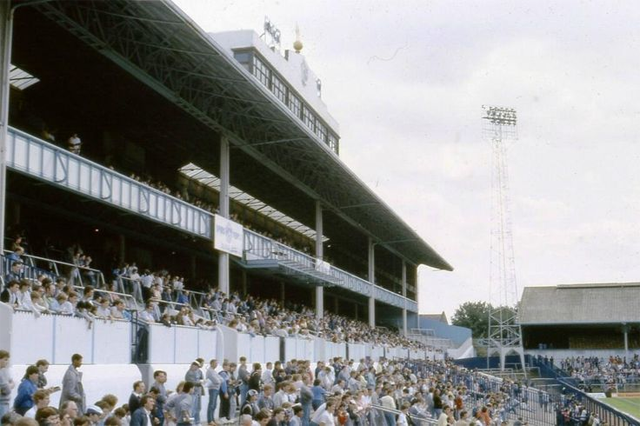
East Stand before it was demolished
Within six years, though, it would be Tottenham Hotspur that would be in decline. The 1988 reconstruction of the East Stand caused issues with supporters who had stood on The Shelf – which was to be largely replaced by executive boxes – and a delay which meant that the clubs first game of the 1988/89 season, against Coventry City (which was due to be the home league debut for a certain Paul Gascoigne, for whom Spurs had lavished an albeit brief record transfer fee of £2m), had to be postponed just six hours before kick-off because assurances which had been given that it would pass the necessary safety regulations to enable the fixture to go ahead as arrange had not been adhered to. Meanwhile, the club overreached itself with deals such as a sportswear deal with Hummel which went sour, with difficulties with supply and external economic pressures leaving the club heavily in debt by the end of the decade.
In the summer of 1990, things came to a head at White Hart Lane for Irving Scholar. With the club by this time heading towards serious financial difficulties, in the summer of that year Scholar approached one Robert Maxwell in a bid to raise further funds for the club through a loan deal. Maxwell loaned the club the £1.1m required to sign Gary Lineker from Barcelona and for a while it looked as if Maxwell might even buy the club, but this time it was Scholar who lost the battle in the boardroom – other members of the board were solidly against Maxwells involvement at the club, the support was implacably involved with his involvement and the fact that Scholar was borrowing from him in itself said a lot about the clubs by now parlous financial state – and he resigned his boardroom position in early in 1991 after shares in the club were suspended on the stock exchange. After a protracted battle against Maxwell, Terry Venables – backed at the time by Alan Sugar – would eventually gain control of the club in June of 1991.
Albert Einstein famously said that the definition of madness is doing the same thing over and over again and expecting different results. On two separate occasions, Irving Scholar was involved in the stock market flotation of a football club and both occasions - Spurs and Forest - discord between those interested primarily in making money and those who put the interests of the football club at heart. Irving Scholar was far from mad. In the early 1980s, he saw that football was failing under what passed for the financial model that it had been following and sought to change it. Those changes – changes which he foresaw with the vast swathes of executive boxes and the talks of a breakaway super league in 1985 – came to pass, for better or for worse, but his conviction that the stock markets could rescue footballs financing had almost disastrous effects for both of the clubs at which he was involved. Criticised as an “out-of-town investor” at Nottingham Forest and eventually run out of Tottenham Hotspur after almost destroying The Shelf and attempting a deal with the devil in the form of Robert Maxwell, Irving Scholar turned out to be the sort of “blue sky thinker” that football could well do without.
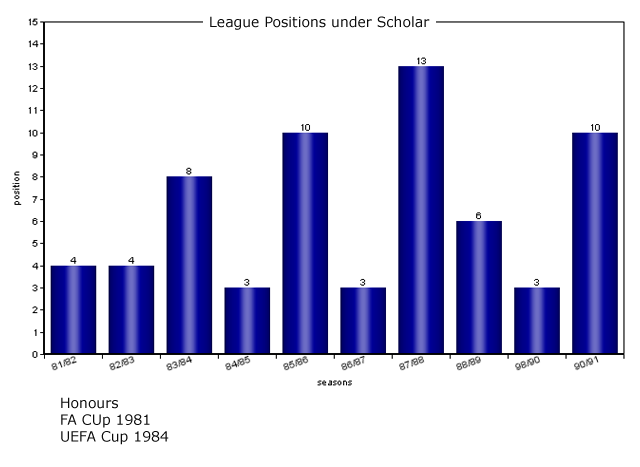
Results in the League during Scholar's tenure.
This case study looks back over almost three and a half decades of Tottenham Hotspur Football Club's Ownerships. It examines the people behind the club from 1982 through to the present day, focusing on the four men at the helm; Irving Scholar, Alan Sugar, Daniel Levy and Joe Lewis.
.
Irving Scholar

Scholar (right) pictured with Terry Venables (left)
In June 1984, shortly after bringing Tottenham Hotspur its first European trophy in twelve years, Keith Burkinshaw left White Hart Lane for the last time. Greeted by the press outside the ground, he gesticulated over his shoulder towards the rear of the shiny new stand behind him. ‘There used to be a football club over there’, he is said to have spat with contempt. These words may even have been apocryphal, but they turned out to be more prescient than anybody at that time than anybody could have imagined at the time. Whilst many might contend that football in Englands revolution began with the beginning of the Premier League in 1992, the truth of the matter is that the formation of this league was in many respects the end of a story rather than the beginning of one, and if that story has a birthplace then we could contend that this was at White Hart Lane. The application of Thatcherism to our national pastime began in a working class corner of North London, and its champion was a Monaco-based property developer in his late thirties: Irving Scholar.
Footballs decline as a spectator sport from the late 1950s on has been well documented, and Tottenham Hotspur itself declined throughout the 1960s and 1970s. Spurs had become the first club to win the league and cup double in 1961, but these were heights that wouldn’t be matched again. Throughout the 1960s and early 1970s there would be occasional false dawns at White Hart Lane, a League Cup here, an FA Cup there, but the retirement of long-time manager Bill Nicholson after sixteen years as its manager in 1974 hit the club hard. Spurs only narrowly avoided relegation the following season and when they did fall through the trapdoor in 1977 it felt like an inevitable culmination to several years of mismanagement. This, though, was about as bad as things got for the club. Burkinshaw may have taken the club down that year, but he romotion back into the First Division at the first attempt the following year, and the arrival of Osvaldo Ardiles and Ricardo Villa in the summer of 1978 was a clear signal of intent from a club emerging from the doldrums. In 1981 and 1982 the club won the FA Cup, and league performances improved sufficiently under Burkinshaw for him to begin to recognised as a man who could potentially get Spurs back to challenging for the league championship.
Away from the pitch, however, the times were a-changing. The West Stand at White Hart Lane was demolished in 1980, but its replacement overran its budget, took fifteen months to complete and left the directors of the club struggling to retain control of the club. In November 1982, and with the club in £4m of debt – a very large sum by the standards of the time – it was time for a change. The old directors, led by the families of Sidney Wale and Arthur Richardson, were swept away and a new group, led by a thirty-five year old property developer called Irving Scholar and with a board of directors led by a solicitor called Douglas Alexiou, replaced them. Within twelve months, the face of Tottenham Hotspur FC (and, we might venture, the face of the ownership of English football clubs) was changed forever. In the summer of 1983, Scholar announced that Tottenham Hotspur would become the first sports club anywhere in the world to float on the stock market. This, he claimed, would allow new investment in the club and patch the holes left by the over-budget West Stand at White Hart Lane and the growing discrepancy between static club incomes and spiraling transfer fees.
The clubs lawyers, however, identified one major issue which might yet cause problems for the floatation – a statute on the FAs rule books which prevented paying part-time directors and unlimited dividends to share-holders whilst restricting what could happen to the assets of a club were it to be wound up. The lawyers came up with a solution to this that was almost too easy to be true. They simply made Tottenham Hotspur FC a wholly-owned subsidiary of Tottenham Hotspur PLC and floated the holding company on the stock market instead. They sought the Football Associations permission to do this but it is not even known whether they received a response, and so it was that the FAs ninety year old statute which was designed specifically to prevent football clubs being used for the purposes of financial speculation was left effectively impotent. It’s a template that has been used time and again over the last three decades.
The following year, in August 1984, the first annual meeting announced pre-tax profits of £902,000 in comparison with £168,000 for the previous financial year. In spite of this, however, the decline of English football continued unabated and by the summer of 1985, with almost one hundred people dead as a result of the disasters of Bradford and Heysel, talk was starting to build of the biggest clubs seeking to break away from the rest. By October 1985 the fact that such discussions were taking place between the biggest clubs was an open secret, with Scholar himself saying after a meeting in Manchester between the owners of Spurs, Woolwich, Manchester United, Liverpool and Everton that, “If we don’t make changes, our sport will continue to decline.” This attempt at a breakaway in 1985 was quelled by the ‘Heathrow Agreement’, which allowed the First Division clubs to keep 50% of all TV and sponsorship revenue, but change, by this time, was in the air for the biggest clubs in England.

East Stand before it was demolished
Within six years, though, it would be Tottenham Hotspur that would be in decline. The 1988 reconstruction of the East Stand caused issues with supporters who had stood on The Shelf – which was to be largely replaced by executive boxes – and a delay which meant that the clubs first game of the 1988/89 season, against Coventry City (which was due to be the home league debut for a certain Paul Gascoigne, for whom Spurs had lavished an albeit brief record transfer fee of £2m), had to be postponed just six hours before kick-off because assurances which had been given that it would pass the necessary safety regulations to enable the fixture to go ahead as arrange had not been adhered to. Meanwhile, the club overreached itself with deals such as a sportswear deal with Hummel which went sour, with difficulties with supply and external economic pressures leaving the club heavily in debt by the end of the decade.
In the summer of 1990, things came to a head at White Hart Lane for Irving Scholar. With the club by this time heading towards serious financial difficulties, in the summer of that year Scholar approached one Robert Maxwell in a bid to raise further funds for the club through a loan deal. Maxwell loaned the club the £1.1m required to sign Gary Lineker from Barcelona and for a while it looked as if Maxwell might even buy the club, but this time it was Scholar who lost the battle in the boardroom – other members of the board were solidly against Maxwells involvement at the club, the support was implacably involved with his involvement and the fact that Scholar was borrowing from him in itself said a lot about the clubs by now parlous financial state – and he resigned his boardroom position in early in 1991 after shares in the club were suspended on the stock exchange. After a protracted battle against Maxwell, Terry Venables – backed at the time by Alan Sugar – would eventually gain control of the club in June of 1991.
Albert Einstein famously said that the definition of madness is doing the same thing over and over again and expecting different results. On two separate occasions, Irving Scholar was involved in the stock market flotation of a football club and both occasions - Spurs and Forest - discord between those interested primarily in making money and those who put the interests of the football club at heart. Irving Scholar was far from mad. In the early 1980s, he saw that football was failing under what passed for the financial model that it had been following and sought to change it. Those changes – changes which he foresaw with the vast swathes of executive boxes and the talks of a breakaway super league in 1985 – came to pass, for better or for worse, but his conviction that the stock markets could rescue footballs financing had almost disastrous effects for both of the clubs at which he was involved. Criticised as an “out-of-town investor” at Nottingham Forest and eventually run out of Tottenham Hotspur after almost destroying The Shelf and attempting a deal with the devil in the form of Robert Maxwell, Irving Scholar turned out to be the sort of “blue sky thinker” that football could well do without.

Results in the League during Scholar's tenure.

